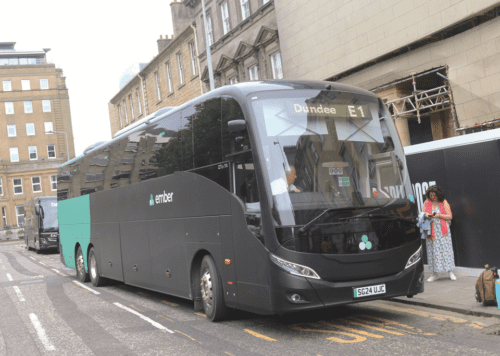
252 new electric buses will be making their way onto Scotland’s roads thanks to new funding, which will be administered by Zenobē
Scottish operators are set to benefit from a £41.7 million investment in bus decarbonisation. Scotland’s First Minister John Swinney has announced that a bus industry consortium will deliver 252 new zero-emission buses and coaches, backed by Scottish Government investment.
The £41.7 million grant funding will support eight operators, and be led by electric vehicle fleet specialist Zenobē. It will deliver a fleet of new buses along with a Scotland-wide charging network for use by all buses, coaches and HGVs. The investment completes the second and final round of subsidy from the Scottish Zero Emission Bus Challenge Fund (ScotZEB 2), which brings together businesses from across the bus, energy and financial sectors, and builds upon £113 million the Scottish Government has already invested in zero emission buses and supporting infrastructure.
First Minister John Swinney said: “Supporting zero-carbon buses as a sustainable means of public transport across Scotland will connect communities and open up new economic and social opportunities. This investment will deliver 100 new inter-city bus routes and reduce greenhouse gas emissions by more than 600,000 tonnes over the lifetime of the fleet by encouraging more people to swap the car for efficient public transport, which is crucial to reaching net zero by 2045.
“Every £1 from the Scottish Government will leverage £3.20 of private sector investment – demonstrating that our shared decarbonisation goals can be met by working together when it comes to removing carbon emissions from our bus and coach fleets.
“All bus and coach operators, including those operating in smaller towns and communities, will benefit from both the novel approach to financing and the Scotland-wide charging network that will be delivered, helping other modes of transport make the switch to electric vehicles too.”
Co-founder and director of Zenobē Steven Meersman said: “We look forward to delivering an additional 252 vehicles and associated charging infrastructure with our consortium partners. This is on top of our existing 110 vehicles in Scotland and alongside our £750 million commitment to battery energy storage systems in the region.
“The consortium brings together family-owned coach companies, well established bus operators, an innovative electric bus start-up and the NHS, showing how private capital can help public funding go the extra mile.”
Policy lead for the Road Haulage Association Chris Ashley commented: “The announcement of additional investment via ScotZEB 2 in the charging network for buses, coaches and HGVs marks another significant step forward as the commercial vehicle sector seeks to reduce its carbon emissions. Moving away from fossil fuels requires a change of mindset on how everyone operates. The access to charging infrastructure via ScotZEB 2 is a welcome initiative to help commercial vehicle operators plan the introduction of zero emission vehicles into their fleets.”
The grant funding will be provided to Zenobē Energy. which will administer the funds as appropriate amongst consortium members to develop the planned Scotland-wide charging network for use by PSVs and HGVs. The successful project includes Ember, NHS Greater Glasgow & Clyde, Premier Coaches, McGills, Stagecoach, Hairy Haggis Tours, Maynes Coaches, and D&E Coaches.

